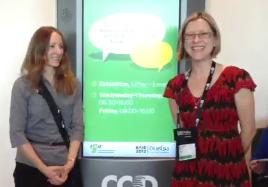Distinction between 'local' and 'foreign' challenged by culturally-diverse students
Published on 25 September, 2012
Many ‘domestic' students in Australia and Denmark have culturally diverse heritage and/or experience, challenging the conventional distinction between local and foreign students.
That's according to a report on similarities and differences between Australian and Danish contexts, co-presented by CQUniversity International Education Research Centre Director, Assoc Prof Alison Owens and Assoc Prof Maribel Blasco of Copenhagen Business School.

Assoc Prof Maribel Blasco (left) and Assoc Prof Alison Owens
Their presentation from research on ‘Internationalisation and Indifference' was given during the recent European Association for International Education Conference (EAIEC) conference in Dublin.
The duo's ongoing research investigates the views of the respective domestic student cohorts in relation to the presence of international students in classes and the impact of such diversification on the education experience.
Australian universities have higher ratios of international students than Danish institutions, originating from a wide range of Asian countries, whereas international students in Denmark are predominantly from European countries, with growing numbers of Chinese enrolments.
"About half of the Australian students I interviewed were recent migrants," said Assoc Prof Owens. "The other half of the interviewees were Australian born but largely mature-age students with some overseas study or living experience and an interest in internationalisation. The stereotypical Australian school-leaver is either not at university or not interested or available to discuss internationalisation."
Danish students tend to participate in study exchange programs at much higher numbers than Australian students and have greater bilingual or multilingual skills.
Both Danish and Australian students interviewed welcomed the presence of international students in their classes and valued the practical examples they provided of overseas contexts and cases related to the discipline.
Both cohorts also expressed admiration for the strong work ethic and resilience displayed by international students. Class participation was considered to be successful as a consequence of the teacher's skill and planning rather than cultural background of students.
Interviewees suggested that both CQUniversity and CBS classes often have low numbers of ‘domestic' students attending for different reasons and that this might prohibit integration opportunities between domestic and international students. The option to study online was considered to contribute to this at CQUniversity, whilst the examination-only system at CBS did not require attendance at classes.
It was pointed out by interviewees that whilst international students clustered in same-culture groups, the same occurred for domestic students but was not so ‘visible' as they outnumbered foreign students and were the host culture.
It was suggested that improved social hubs where students could comfortably ‘hang-out' and engage in planned activities would contribute to more social exchange and integration.
This research is continuing with data currently being collected from RMIT students also. Journal publication is anticipated in 2013.

